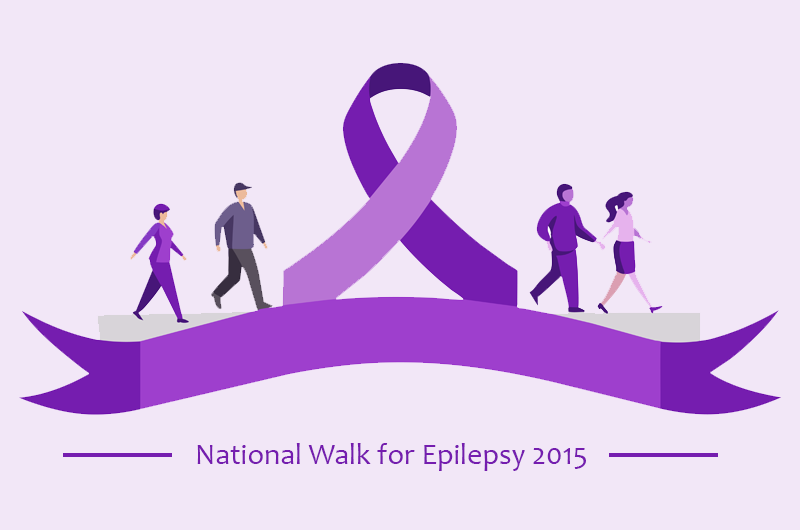Epilepsy (also referred to as “fits”) is a serious neurological disorder in which the central nerve cells in the brain work abnormally causing seizures. According to 2014 statistics, approximately 2.2 million people have this condition in the United States. It is estimated that about 1 out of 26 people will develop this condition at some point in their lifetime. Each year more than 1, 50,000 Americans are diagnosed with this condition with the incidence being higher in young children and older adults.
To highlight the importance of epilepsy awareness, the National Walk for Epilepsy will be observed on April 11, 2015 in the United States. Sponsored by the Epilepsy Foundation, this Walk is a preeminent event that brings together the epilepsy community to show the world the importance of generating awareness about this neurological disease and the need to raise funds for more epilepsy research.
The event is a significant initiative in terms of raising funds and generating widespread awareness about this debilitating disease. Thousands of dedicated supporters will walk together to mark the significance of this great event. A national walk brings together a community of people who are affected by this brain disorder and individuals who support this important cause.
The 2015 event will begin on the morning of April 11 at the Washington Monument Grounds with an early T-shirt pick up at 7.30 am, followed by an opening program at 8.30 am and the 5 km walk that begins at 9 am. The walk is open to people who want to fundraise, sponsor, or volunteer at the event.
The campaign is a strong platform to educate the public about the health care options for people living with this disease and provide research funding towards better treatment options. You can register as an individual or as a team for this event. The registration fees for this program are $35 for adults and $20 for youth participants (12 years and below). The fund raised as part of this campaign will be used to provide services for people living with this disease and organize awareness programs for proper seizure recognition and first aid.
Early Diagnosis of Epilepsy Symptoms – Importance
With this disease, the normal pattern of neuronal activity becomes disturbed causing strange sensations, convulsions, muscle spasms and loss of consciousness. There are different potential causes for this condition and there are several types of seizures as well. Generally, anything that disturbs the normal pattern of neuron activity (from illness to brain damage to abnormal brain development) can lead to seizures.
For early and precise diagnosis of the disease symptoms, neurologists recommend routine screening programs as these help in better disease management. As part of the diagnosis, the neurologist will evaluate the complete medical history of patient, analyze symptoms and perform a neurological exam. There are different types of screening tests such as blood tests, computed tomography (CT), electroencephalogram (EEG) and magnetic resonance imaging (MRI) which neurologists may recommend to monitor the brain activity and recommend the correct treatment modality required.
In most cases, having a single seizure does (due to a high fever) does not necessarily signify that the person is suffering from epilepsy. If two or more seizures occur, then it can be confirmed that the person is suffering from this severe neurological disorder. Therefore, premature diagnosis of symptoms will help to prevent further complications. Undiagnosed symptoms can lead to different problems like sudden loss of awareness or consciousness, learning disabilities, and behavioral issues.
Coding Epilepsy
It is important for neurologists to have a thorough understanding about the new guidelines or practices for medical billing and coding. Accurate diagnostic and procedural codes must be reported on the claims to receive on-time and correct reimbursement.
Physicians use the following ICD codes for medical billing purposes
ICD-9-CM Codes
- 345 – Epilepsy and recurrent seizures
- 345.0 – Generalized non-convulsive epilepsy
- 345.1 – Generalized convulsive epilepsy
- 345.2 – Petit mal status
- 345.3 – Grand mal status
- 345.4 – Localization-related (focal) (partial) epilepsy and epileptic syndromes with complex partial seizures
- 345.5 – Localization-related (focal) (partial) epilepsy and epileptic syndromes with simple partial seizures
- 345.6 -Infantile spasms
- 345.7 – Epilepsia partialis continua
- 345.8 – Other forms of epilepsy and recurrent seizures
- 345.9 – Epilepsy unspecified
ICD-10-CM Codes
In ICD-10-CM, code G40 and its complete sub-categories offer more specific representation of different types of epilepsy.
- G40 – Epilepsy and recurrent seizures
- G40.0 – Localization-related (focal) (partial) idiopathic epilepsy and epileptic syndromes with seizures of localized onset
- G40.1 – Localization-related (focal) (partial) symptomatic epilepsy and epileptic syndromes with simple partial seizures
- G40.2 – Localization-related (focal) (partial) symptomatic epilepsy and epileptic syndromes with complex partial seizures
- G40.3 – Generalized idiopathic epilepsy and epileptic syndromes
- G40.4 – Other generalized epilepsy and epileptic syndromes
- G40.5 – Epileptic seizures related to external causes
- G40.8 – Other epilepsy and recurrent seizures
- G40.9 – Epilepsy, unspecified
Let Us Join Hands in the Fight against Epilepsy
Let us walk together for this great cause and bring a difference in the lives of people living with this brain disorder.




